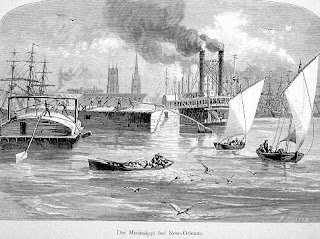 Sitting out back at Kathleen and Abner’s, in their patio with its carved Porta Coeli sign and odorous dog turds on the bricks. Ivy and Moses-in-the-basket spill over the walls. On the drunken trollop’s side of the house, a baby screams frantically. On the other side, the bearded Yankee neighbor is assiduously cleaning house. I see the cabinet open, with its array of cleaning stuffs. I’m embarrassed to see him, since Steve and I have just been arguing, I raising my voice shrewishly.
Sitting out back at Kathleen and Abner’s, in their patio with its carved Porta Coeli sign and odorous dog turds on the bricks. Ivy and Moses-in-the-basket spill over the walls. On the drunken trollop’s side of the house, a baby screams frantically. On the other side, the bearded Yankee neighbor is assiduously cleaning house. I see the cabinet open, with its array of cleaning stuffs. I’m embarrassed to see him, since Steve and I have just been arguing, I raising my voice shrewishly.Pleasant March sky. A mockingbird singing very sweetly behind me, and some more raucous bird (a jay?) cawing nearby.
I think of all the sad days I sat reading and writing in just this spot in 1984 when Steve left me here, as I struggled to write the dissertation. I decade later, I feel no wiser. It was Holy Week when I arrived in 1984: a long paschal mystery since then. I just don’t see its meaning.
To wit: yesterday, Pat R. called Kathleen and Abner to ask for our phone number. It was the first time we’d heard from him since 1978, when we lost contact . . . .
This makes me ponder even more a question I ponder and ponder after my talk the other night, when people from every layer of my life came to hear the lecture—Bill D. from my undergrad days (saying, Why is Bill Lindsey not a symbol of Loyola’s achievement?), Rick B. from the prayer group days, LIM students, Dorothy M. from my time teaching at St. Dominic’s.
What does it all mean? What’s the claim of all this life-lived on me? I’d like to see each layer as separate, each episode as a closed book. Now they’re all flowing together.
I can only conclude that flow is the word. As I wrote in my journal soon after New Year’s in 1993, when I was about to get the terminal contract, something flows strongly under my life, through it. A river, grace, life itself, in its sweet, strange, maddening incomprehensibility.
And in, through, every life. It’s so chastening, and yet so endearing, to see that, somehow, I’ve touched some of those I’ve taught in a way that influences their lives. Deep calling to deep; the depths running underneath my existence eddying and pooling with their depths.
Where to go with this; what to do with it? I don’t see. Thomas Moore says that, in being baptized, Jesus gave himself to the stream. I would (I hope) do so, if I knew how, where. I don’t see.
But maybe this is what this awful time is about, in part. It’s about letting oneself be carried by that river even when one doesn’t see. It’s about learning how life is a force running through one’s limited temporal-spatial boundaries.
I keep thinking of Rilke, and the call to be conscious, the struggle to live so stretched awake that we see, hear, taste, feel. We bought the Robert Bly translation of Rilke the other day, and I was bowled over by his title poem for the songs collection—if we don’t sing, what’s left to us?
And a tiny slug just fell on this journal as I closed it, reminding me that corruption trials through every word I wrote, because my heart is corrupted—with self-infatuation. And my pen suddenly drips black ink. My words, my thought, my heart are hardly sine macula.






